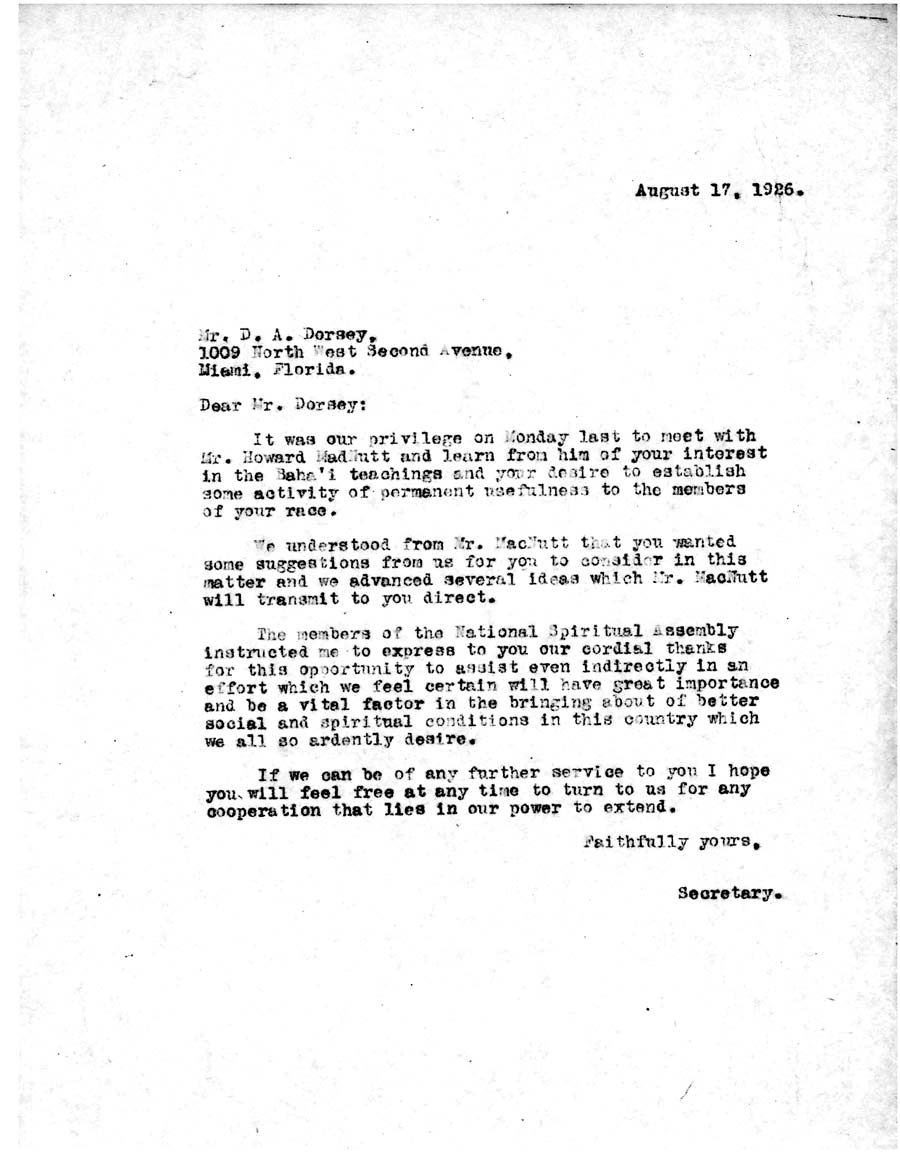The Bahá’í teachings, rooted in the principles of unity, justice, and dignity, offer profound insights into the human condition, particularly regarding the experiences of marginalized communities. A significant embodiment of these teachings is found in the letter addressed to Dana Dorsey, a pioneering African American community leader in the early 20th century. This correspondence ultimately serves not only as a historical artifact but also as a manifesto of the Bahá’í perspective on dignity and justice.
The letter, rich in its content, emerges from a context marked by racial prejudice and social inequity. Its primary aim was to recognize the inherent nobility of every individual, irrespective of race or social standing. The Bahá’í writings emphasize that every person is a reflection of the divine attributes, thus deserving of respect and dignity. The epistolary nature of the letter allows for both personal and universal expressions of these tenets.
At the outset, the letter underscores the intrinsic nobility of the individual. It posits that the essential nature of humanity is one that aligns with principles of justice and equity. This concept of dignity is not merely an ideal but a cornerstone of Bahá’í belief that necessitates practical application. Each individual, regardless of their societal position, contributes to the tapestry of human existence. Hence, the abhorrence of racism and discrimination is deeply entrenched in Bahá’í doctrine.
The significance of the letter transcends its immediate context, forging connections to broader Bahá’í teachings regarding racial unity. The precepts set forth by Bahá’u’lláh, the founder of the Bahá’í Faith, advocate for the dissolution of racial prejudices. The correspondence to Dorsey emerges as an embodiment of these principles, illustrating how individual actions can reverberate through time to foster communal harmony. In this sense, the letter functions as a microcosm of the movement toward global justice.
Moreover, the letter’s emphasis on education serves as another pivotal theme. The Bahá’í teachings assert that knowledge is not only power but a pathway to the realization of justice. In the context of the struggles faced by African Americans, education has historically been a critical avenue for empowerment. The correspondence implores its recipient to seek knowledge and enlightenment, emphasizing that such pursuits are essential in transcending the limitations imposed by society. This is a call to awaken to one’s potential and, in doing so, elevate one’s community.
The epistle also reflects the Bahá’í principle of collective responsibility, where the elevation of one community is intrinsically linked to the upliftment of another. This interconnectedness underscores the notion that social progress is a collaborative endeavor. The Bahá’í Faith fosters a vision for a future characterized by international cooperation, harmony, and understanding. The letter reiterates the importance of solidarity in the pursuit of justice, making a case for actionable empathy.
In its exploration of social equity, the letter invokes the concept of justice as an essential element of spiritual and societal life. Justice, in the Bahá’í discourse, is not merely a legalistic term but a fundamental reflection of human virtue. It embodies the idea that every individual has a role in shaping a just society. The teachings advocate for the establishment of a new world order based on principles of equity, thereby changing the paradigm through which justice is perceived and enacted.
Furthermore, the emotional resonance of the letter cannot be overlooked. It speaks to the universal human experience of suffering, resilience, and hope. By addressing Dorsey, the letter acknowledges his trials as an African American leader while simultaneously affirming his capacity for dignity and success. This relational aspect of the correspondence is significant as it personalizes the abstract concepts of justice and dignity. It reminds readers that these principles are deeply interwoven with the fabric of human relationships.
In analyzing the Bahá’í teachings through the lens of this letter, one can discern the intricate layers of meaning that resonate with contemporary issues surrounding race and justice. The lessons derived from the correspondence provide a foundation for constructive dialogue aimed at dismantling systemic oppression. It appeals for engagement, urging individuals and communities to act in accordance with the principles articulated in the letter.
This engagement manifests in various forms—community-building initiatives, educational programs, and advocacy for social change. The Bahá’í community’s commitment to these ideals evidences a holistic approach to addressing the complexities of modern society. The teachings advocate for proactive engagement in social issues, aligning personal spiritual growth with communal responsibility. This integration is essential in actualizing the vision of a united humanity.
In conclusion, the letter addressed to Dana Dorsey epitomizes the Bahá’í teachings on dignity and justice, framing a narrative that transcends time and remains remarkably relevant. It is not solely a historical document but a continuing call to recognize the divinity embedded within each individual. The notions of respect, education, collective responsibility, and the quest for justice woven throughout the correspondence offer rich insights and guidelines for contemporary readers aspiring to advocate for dignity and equity in their communities. Embracing these transformative teachings encourages deeper understanding and action toward creating a more just and unified world.
